|
|
|
T o n y B i a n c o - A L B U M R E V I E W S
|
|
|
| STEAMROOM VARIATIONS - VESUVIUS - IN A WESTERN SENSE - OUR GLASS - LINE ISH - UTOMA TRIO |
PAUL ROGERS/TONY BIANCO/PAUL DUNMALL - Cosmic Craftsmen (FMR 185; UK)
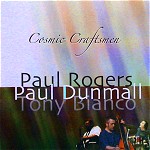
Featuring Paul Rogers on an ALL double-bass, Tony Bianco on drums and Paul
Dunmall on saxes. 'Cosmic Craftsmen' features three long live pieces for
solo drums, a duo with saxes & bass and an even longer trio track. I believe
that the Paul (Rogers & Dunmall) were in an accident on the way to this gig
from a review of that set I saw in The Wire. Either way, nothing really
stops these titanic improvisers from erupting into a mighty force. The
opening solo drums piece is an amazing beginning to our grand journey.
Tony's rolling mallet-work is especially creative in weaving constant waves
around the drums, building organically as the tide goes in and slowly goes
out. This is a most impressive, expressive and melodic drum solo. The tenor
sax and contrabass duo follows and shows how well this duo has long worked
together as they magically match wits and cosmically craft their sounds
together into a fascinating fabric. Dunmall's warm and occasionally
explosive tone always works so well with Roger's massive bass sound and
magnetic bag of sonic streams. The final trio track is especially
astonishing, The trio swirl together in one magnificent force, sailing,
burning and soaring higher and higher into the heavens. There is no turning
back as we ride the waves or drown in the ocean of ideas. Cosmic craftsmen,
indeed! - BLG
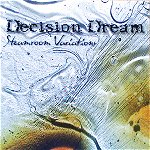 DECISION DREAM - STEAM ROOM VARIATIONS - Jair Rohm Parker Wells / Magnus Alexanderson / Anthony Bianco
DECISION DREAM - STEAM ROOM VARIATIONS - Jair Rohm Parker Wells / Magnus Alexanderson / Anthony Bianco
It tickles me to imagine that I’m hearing some futurist or alternate universe version of a Jimi Hendrix group when I listen to this manic outgrowth of the power trio. Well alright, maybe the freer moments of Hendrix at Woodstock meets a more reflective Fushitsusha. Anyway, it would have been easy for an electro-blowing session such as that on offer here to have deteriorated into shapeless noodling, but somehow, to group credit, I hear very little excess on this disc. In fact, repeated listening reveals Steamroom to be fairly frenetic but streamlined, transparent without loosing viscerality or power. Recorded in one afternoon in London late this past summer, the platter’s basically one mammoth three-part suite with a brief coda for good measure. From the outset, guitarist Magnus Alexanderson, bassist Jair-Rohm Parker Wells and trapist Anthony Bianco serve up a mixture of drone, scree and clatter that manages order through constantly on-the-toes communication, all of which begins fairly softly with vaguely “jazz” inflections in drum timbre. Within the first five minutes though, the line between jazz and noise is straddled, which happens more and more frequently as the disc unfolds in slow jagged arcs. At one point, things die down to near silence, an astonishing and well-executed effect, but it is short-lived. I don’t mean to give the impression that order is lacking here—it most certainly is not, but it usually comes in bizarrely interconnected loops, each one coming off like a microcosmic manifestation of the disc as a whole—organized asymmetry—and so the loops tangle and unwind themselves in perfect counterpoint to everything else roiling and bubbling in tandem. The drums are beautifully recorded, producing some fun spatial allusions if auditioned in “the sweet spot” and it’s often hard to tell bass from guitar, so effect-laden and inter-registral is almost every utterance. Do I even hear occasional delay on the drums—they’re remarkably dry otherwise.
Maybe, and despite my inability to articulate in kind, the best thing about the disc is just how clearly presented everything is. No matter how many levels of feedback, distortion and whatever else is piled atop the remnants of what I’ll jump right on out and call instrumental purity, the trio identity is refreshingly ever-present. This is commendable, and I look forward to hearing wherever these folks take music that I have no qualms whatsoever about labeling fusion.
DECISION DREAM
Drummer Anthony Bianco, bassist Jair-Rohm Parker Wells and guitarist Magnus Alexanderson burn out electric boundaries with their new release Steamroom Variation.
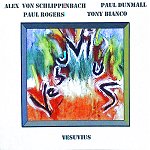 VESUVIUS - Alex Von Schlippenbach / Paul Dunmall / Paul Rogers /Tony Bianco
VESUVIUS - Alex Von Schlippenbach / Paul Dunmall / Paul Rogers /Tony Bianco
This is effectively Mujician with Tony Levin giving way to Tony Bianco on drums and Keith Tippett replaced by Alex von Schlippenbach on piano. But Schlippenbach has always let it be known that free jazz – and sometimes changes-and-rhythm jazz – are still very much what he does. The linear energy he brings to this is very different from Tippett’s more shamanic approach. The music remains more on a single level, without the transcendant leaps you’d expect from Mujician. Vesuvius works wonderfully – two large slabs of urgent, probing sound with no fat and little room for meditative pause. The pianist probes and prods at ideas that float up from some common pool of musical language, and then dismantles them. Paul Dunmall, playing only tenor saxophone this time, resorts to shorter and more angular phrases than usual, with phrasing that contends with the piano line. In a rather uncomfortable position in the stereo picture, Paul Rogers coaxes some highly effective sounds from his seven-string ALL bass, making full use of its cello range end, but never setting aside his familiar role, like a drifting anchor. Tony Bianco’s playing sits much further away from jazz again, even if some of his fast, urgently hissing figures constantly hint at a fast jazz 6/8 without ever resolving into it. He is what makes this such a different sounding date, and such a good one.
The shorter “Salamander” does sound proven in fire, its surface bubbling and shifting like something molten cast into as yet uncertain form. The longer “Leviathan” manages not to lumber, but there are a couple of places where the direction seems in doubt and the four participants lose touch with each other. Even so, this is a remarkable, unexpected record with a real edge.
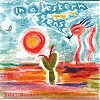 IN A WESTERN SENSE - Tony Bianco (33jazz)
IN A WESTERN SENSE - Tony Bianco (33jazz)
An interesting double-CD featuring the quartet of London-resident American drummer Tony Bianco, with saxophonist Carlos Lopez-Real, pianist Zoe Rahman and bassist Oli Hayhurst. The repertoire is 11 compositions by Bianco, who operates somewhere between a Lennie Tristano-like Cool School bebop style, folk dance derivations and raw Coltranesque free-jazz.
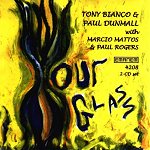
HOUR GLASS - Tony Bianco / Paul Dunmall / Marcio Mattos / Paul Rogers (emanem 4208) Excerpts from reviews:
These recordings will inevitably raise the question - is an hour too long? If the aim was to 'run into certain musical episodes that are amazing', then I think they have succeeded. There are certainly passages here that contain music that I have never heard from these participants, or perhaps from anyone else. So stay the course and you will be well rewarded. (As an aid, the two performances have been marked up as four tracks each.)
"Two stunning hour-long continuous performances driven by drummer Tony Bianco's supercharged and yet crisp metrical variations. Saxophonist Paul Dunmall matches his partner's improbable stamina and inventive phrasing. At once assertive and rigorously probing, Dunmall has evolved an unmistakably authoritative voice. On the first session, where he plays tenor, their headlong roll is rounded out with the sonorous spring of Marcio Mattos' bass. On the second, with Dunmall on soprano, it's Paul Rogers, wielding a new six-string bass fitted with sympathetic strings, who thickens and enriches the unceasing stream. Mattos is luxuriant, Rogers urgent and eloquent. Both respect the clarity and concentration of Bainco and Dunmall's forceful trajectory."
"There are few clues in the two hour-long performances on this exhilarating album to tip off the blindfolded listener that HOUR GLASS was not recorded in New York during the '70s. This two-CD set exemplifies the spirit and stamina prevalent in such units as Sam Rivers' trios. Labelling drummer Tony Bianco and saxophonist Paul Dunmall's respective work-outs with bassists Marcio Mattos and Paul Rogers as loft jazz may be misleading, but arguable not more so than tagging it as improvised music, particularly as the latter designation, at least in Britain, increasingly signifies sensibilities considerably removed from the free jazz-informed exultancy that is the co-leaders' stock in trade.
"What is it with drummer Tony Bianco's playing that forces Paul Dunmall to put all the talent and energy he can spare in the music? This pair ranks among the most exciting units of high-energy improv in the early 2000s (matched maybe only by Paul Flaherty and Chris Corsano). HOUR GLASS adds two hours to their recorded output. Tony Bianco allies grace and power, propelling both sessions with unflinching stamina. On tenor, the saxophonist sticks closer to the free jazz idiom, while the soprano takes him deeper into circular breathing and abstract thinking. The two bass players have similar attitudes but their instruments bring out different colours. The second piece has a slightly awkward ending -- the conscious effort to stop after an hour is more obvious (as in forced) than in the first piece. But that remains a minor flaw for a brilliant album. This music is not for reductionism purists and listeners with a short attention span. On the other hand fans of Mujician will greatly appreciate."
"The trio with Mattos is marked by the bassist's ceative manipulation of electronics, creating the kind of expansive drones and sonic environments that Dunmall likes to work within. He plays tenor throughout the continuous one hour piece, a feat of physical control that equals some of Evan Parker's titanic performances. The other set finds him working with Paul Rogers. It's a more familiar partnership but no less stimulating and rewarding and the even longer The Teepees Dive Deeply is a wrenching, joyous experience."
"The propulsive drumming of Bianco and the continuously ripping sax of Dunmall (particularly awesome on the soprano in the second CD of this double set 62 minutes named The Teepees Dive Deeply) are the main colours in this release. More than in other Emanem recordings, this has a contemporary 'jazzy' feel and - with ideas flowing one after another, often without stopping for VERY long spurts - it nevertheless results as a pretty relaxing meeting among complex musical personalities. What's really different here is the use of bass: in the hands of Mattos, who plays on the first set Hour Glass, you get classic deep, solid notes; the instrument is meant as a strong expressive communicator and meshes perfectly in a global conversation. On the other hand, with the pluri-stringed A.L.L. bass played by Rogers, one can almost smell wood, being its character a little more 'light-hearted' than the regular acoustic bass (but what a sound... likely to be appreciated by guitarists more than bassists). Tony Bianco's light but steady pulse and the never ending lung pumping by Paul Dunmall are absolutely astonishing; the same old 'thumbs up' is required, but that's no news to the label's aficionados."
"Dunmall matches the inexhaustible percussive attack of Bianco. Each disc is an hour-long free improvisation workout. This post-Coltrane approach could even be considered post-Rashied Ali. Dunmall doesn't so much stand toe-to-toe with the likes of Peter Brötzmann blowing powerful blast of sound. He works in a shrewd energy pattern modulating much like the energy drummer Bianco. Bianco's approach might start with Ali, but he travels the same roads as Milford Graves and Frank Kiermeyer. Raucous playing is not his bag, he creates wave upon wave of energy working the cymbals in a continuos pattern. Bassists Mattos and Rogers hold their own, Mattos supplying light touches of electronics and Rogers meeting the energy waves head on. A brilliant addition to this uncompromising label."
"This is musicmaking on the heroic scale, the hour-long duration of each piece the aural equivalent of some giant Abstract Expressionist canvas. Although such marathon high-octane performances now have a long tradition behind them (and the example of Coltrane's late music weighs heavily on the music), they still present unusual challenges for both musicians and listeners, especially when (as here) the musicians go without the safety net of precomposed material. Perhaps a little unusually, both sessions on the set were recorded in the studio; one more often encounters such large-scale improvisation in the concert situation, where the spur of an audience helps keep inspiration and energy levels from flagging.
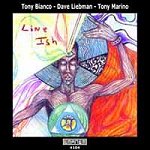
LINE ISH - Tony Bianco / Dave Liebman / Tony Marino (emanem 4104) Excerpts from reviews:
"LINE ISH sees Tony Bianco back in the USA for a powerful recording session with Dave Liebman and his trusty bassist of over 15 years, Tony Marino. A suite of alternating written-down themes, solos and improvised group variations, LINE ISH draws on the heart and soul of the free jazz idiom: the energy, the emotion, the willingness to explore, and the swing. Liebman is credited for most of the writing - limited to a few heads and the simple macrostructure of the piece. Besides his tenor and soprano saxes, he also plays wooden flute in the Group Interlude and he sits down at the piano for the whole duration of Line Ish: Part Two. The melodic material frames the improvisations and gives the piece and movement of ebb and flow. Each musician gets his share of the spotlight and the whole proceedings are extremely amicable, maybe even too polite. But Bianco nails down his typical octopusian playing, Liebman throws in some of his most vehement tenor lines of later years, and Marino's Bass Interlude seems to arch back to Henry Grimes' heyday with Albert Ayler. A good, honest session."
"Liebman echoes his Lookout Farm days on LINE ISH, joining drummer Tony Bianco and Tony Marino on a dazzling free jazz suite. In addition to playing soprano, tenor, and wooden flute, he is also heard at the piano. The disc is a suite with various interludes set within. The opening cut, Line Ish, Part One, opens with a moody duet between Liebman and Marino. Blowing with the kind of passion Coltrane used to summon, while Bianco thrashes beneath the moodiness and Marino adds dark arco backdrop, Liebman blows fiercely on the straight free jazz burnout. Marino's arco solo is brooding and dramatic; he spirals up to the higher notes, then falls like Icarus into the waiting arms of Liebman's high-pitched wail marking the transition into the next movement.
The interlocking movements and interludes are solo and group efforts. Marino's Middle Eastern theme-spiced interlude is a fierce plucked effort, rich in melody and dexterity. His solo segues directly into the next collective movement announced by Bianco's cymbal flourishes (his drumming is a guiding hand, firm but never ostentatious); Liebman, heard at the piano, mines the instrument's depths by strumming the strings from the inside as the space eventually narrows while the tempo increases and the interplay races toward chaos. Liebman's solo interlude features him hitting astonishingly bird-like high pitches, screaming yet whispering. Part Three is a furious cauldron of soprano, plucked bass and drums (Bianco laying down Elvin Jones-like polyrhythms). The following Group Interlude features Liebman on flute with a fierce drum solo by Bianco leading into the final movement of the suite. Liebman falls in on tenor, followed by Marino on plucked bass, and then all come together for the final whirlwind. LINE ISH is a tour de force, expertly conceived and brilliantly performed, an outstanding display of the spirit and empathy that exists between the players."
"Saxophonist Dave Liebman puts on his free jazz hat for this powerful trio release. Drummer Tony Bianco is a relentless whirlwind while Tony Marino provides the axis for an intense session that intimates notions of how free form art is capable of making perfect sense."
"Saxophonist Dave Liebman's reputation has often rested on his deliberation for carrying the torch laid down by John Coltrane. Expressionistic, with an informed world view, he is as comfortable in a melodic and relaxed setting, as he is in a more free context, beautifully documented on this collaboration with drummer Tony Bianco and long-time bassist Tony Marino. LINE ISH finds the trio exploring freedom that has few reference points, but nevertheless comes across as focused and not the least bit self-indulgent.
"Dark overtones pervade the music on LINE ISH. The session is a forum for Liebman to soar on high with extended improvisations while Bianco and Marino construct a tense polyrhythmic web around him. The music breathes openly as it progresses in wave after wave of spontaneous discovery. On the initial segment, Bianco builds a quiet fire of intensity that Liebman fans into full blaze with his vibrant tenor escapades. The second part penetrates deeply; it begins with soulful bass lines and flows into a terse piano solo by Liebman where he ponders weighty matter characterized by jagged pensiveness.
"I've never really followed the music of Liebman, hearing him a bit in the 70's and every now and then since. But here is an excellent, well thought out suite of free improvised music giving ample space to all three artists and some 'out' sounds from Liebman."
"The music is most definitely jazz-oriented, but Liebman's loosely sketched lines allow for plenty of extemporaneous blowing. Bianco's no stranger to working with Coltrane-influenced saxophonists having teamed with Paul Dunmall and Simon Picard on an earlier Emanem, UTOMA TRIO. He's also at the heart of HOUR GLASS, another session with Dunmall and the switch-hitting basses of Marcio Mattos and Paul Rogers. The music here is in line with those previous projects though Liebman etches a more obvious spiritualized aura into the contours of his horns. There's also room for his piano and even a bit of contemplative wooden flute to make appearances. The overarching metaphysical mood carries over into the colored pencil cover art depicting a gaunt Brahmin deep in meditative thought.
"Tony Bianco's mercurial drumming is the propeller of this great trio, where each voice brings common sense and solidity in every single moment. Dave Liebman applies his phrasing like a whirlwind, quivering, self-consciously groundbreaking, exploring theme fragments and pulling out harmonics like a drink of fresh water. The jawboning sound of Marino brings back fluids to parched ears, emerging like a paramount element even in a cohesive setting like this. Bianco's wrists are probably made of highly elastic rubber: his sticks' command is a good explanation for a scorching yet natural playing, more evident than ever during his solo parts. The feeling here is that this is a nugget, a record that's destined to stay, without flashes but with feet planted in the concrete."
"I haven't heard Liebman for a while but it was a real treat to find his searching tenor pitted against Marino's arco bass on the first part of Line Ish. The ecstatic writhing of the horn offset the strings' slow burn, something which continued in a slightly different vein when Marino's grave playing took a front seat with Bianco's percussion working deftly around him. There is a strong sense of three players pulling in the same direction but using different approaches to get there.
"Dave Liebman has maintained a rigorous release schedule since the turn of the century, appearing on a handful of releases each year in settings ranging in size from solo to big band. But to hear the saxophonist in the form he realizes on this recording, a trio date with his regular quartet bassist Tony Marino and American expatriate drummer Tony Bianco, you'd be excused for thinking it was a recently discovered session from his Coltrane disciple days with Elvin Jones and Miles Davis' bands. Yes, you'd be hard-pressed to find playing this far outside in Liebman's recent discography (the solo COLORS set on hatOLOGY notwithstanding), which makes LINE ISH even more of a curiosity.
"UTOMA TRIO numbers among the essential tenor trio projects of this period."
"The trio is superb, with two tenor saxophones pitched against the drum kit. It falls into a continuum of Dunmall records that represents one of the most stimulating saxophone documents of recent times."
"Drummer Tony Bianco's resume reads like a laundry list of disparate musical talent. Here's a man who has performed with rock and rollers Chuck Berry and Edgar Winter, modern jazz bassist Reggie Workman, saxophonist Dave Liebman and many others. However with this release, the drummer along with tenor saxophone titans Paul Dunmall and Simon Picard derive inspiration from John Coltrane's free-style explorations
"I hadn't heard such powerful and engaging blowing in a while. Three jazz musicians going at it together, pushing each other off-balance, playing with each other for an hour, putting their guts in their instruments, playing with as much energy as possible. Sometimes, that¹s simply what free jazz is all about. And these three deliver a magical moment. Centre stage is the under-documented drummer Tony Bianco, a busy player unconcerned with extended techniques. He hits often, everywhere, but always remains within the jazz idiom. Left stage is tenor saxophonist Paul Dunmall, a fiery musician who can deliver great energy when at his best. Stage right is Dunmall's friend Simon Picard, another tenor. Both share the same language partly inherited from Coltrane. UTOMA TRIO is another take at the sax/drums face-off exemplified by Coltrane and Rashied Ali (Interstellar Space). A 10-minute track is squeezed between two half-hour improvs - a good idea as it lets the listener rest a little. Bianco is unstoppable, while tenors trade solos or engage in battle. It could have been tiresome but it¹s not: the level of intensity translates into excitement and the listener comes out of UTOMA TRIO flushed but happy."
"In the post-INTERSTELLAR SPACE cosmos of improvised music any sort of drums-saxophone pairing is bound to draw comparisons to the seminal date by John Coltrane and Rashied Ali, and the timeline for the music could forever hence be cleanly be divided into pre- and post- periods. The UTOMA TRIO, while expanding slightly on the instrumental template pioneered by Trane and Ali through the addition of a second tenor, makes no excuses for this conspicuous source of inspiration and instead embraces and builds upon it.
"The drums plus two tenors format allows plenty of space for solo improvisation. Bianco's role is pivotal, holding proceedings together. For historical reasons, it is often tempting to see such tenor meetings as heavyweight contests, with the need for a 'winner' and a 'loser'. I shall resist the temptation, and declare the listener as the winner on passages where both tenors play together."
|